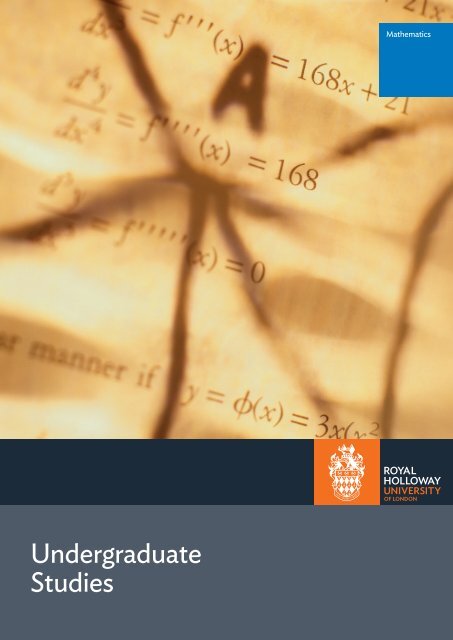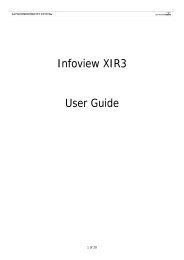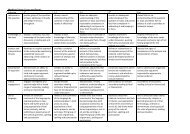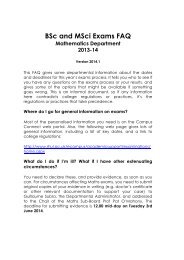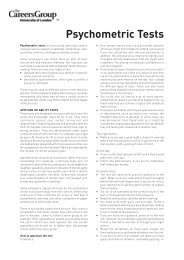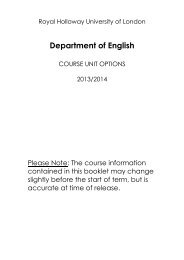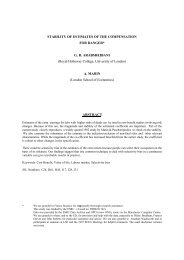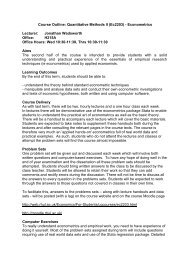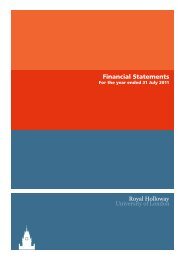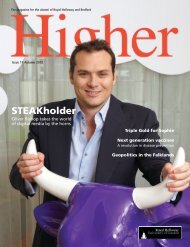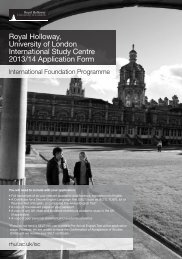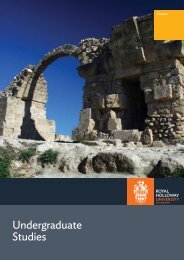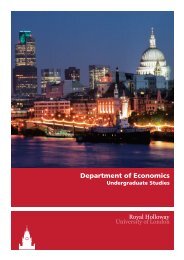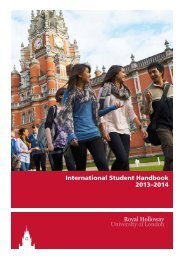Undergraduate brochure - Royal Holloway, University of London
Undergraduate brochure - Royal Holloway, University of London
Undergraduate brochure - Royal Holloway, University of London
You also want an ePaper? Increase the reach of your titles
YUMPU automatically turns print PDFs into web optimized ePapers that Google loves.
<strong>Undergraduate</strong>StudiesMathematics
<strong>Royal</strong> <strong>Holloway</strong> is widely recognised on the worldstage as one <strong>of</strong> the UK’s leading teaching andresearch universities. One <strong>of</strong> the larger colleges<strong>of</strong> the <strong>University</strong> <strong>of</strong> <strong>London</strong>, we are strong acrossthe sciences, social sciences, arts and humanities.Our 8,500 students work with internationallyrenowned scholars in 20 academic departments.The <strong>University</strong> <strong>of</strong> <strong>London</strong> degree gained by ourtalented, high-achieving graduates is valued theworld over.As a cosmopolitan community, with studentsfrom 130 countries, we focus on the supportand development <strong>of</strong> the individual. Our friendlycampus, just 19 miles west <strong>of</strong> central <strong>London</strong>,provides a unique environment for universitystudy. Campus life revolves around the Students’Union, which runs over 100 societies and sportsclubs, and we are recognised as <strong>London</strong>’s bestsporting college.2 Department <strong>of</strong> Mathematics
MathematicsContentsThe Department <strong>of</strong> Mathematicsis a lively and friendly place with aninternational reputation for the quality<strong>of</strong> its teaching and research. Academicstaff are active in pioneering researchwhich is making an impressive impacton the world stage.This strong research culture influencesour curriculum, helping studentsto keep in touch with the latestdevelopments in the field. Our staff’spassion and enthusiasm for the subjecttransmits through their teaching andthey are on hand if you need advice orsupport. Study Mathematics with usand open up a wealth <strong>of</strong> opportunities.Why study Mathematics? 4Why choose Mathematics at <strong>Royal</strong> <strong>Holloway</strong>? 5Admissions and entry requirements 6Degree structure 7Degree options 8Teaching and assessment 10Other information 11Your Future Career 12Academic staff 14This <strong>brochure</strong> is designed to complement <strong>Royal</strong> <strong>Holloway</strong>’s<strong>Undergraduate</strong> Prospectus and information on the department’s website atroyalholloway.ac.uk/mathematicsIt is also available as a PDF at royalholloway.ac.uk/studyhere/prospectus/<strong>brochure</strong>sContact detailsHead <strong>of</strong> DepartmentDr James McKeejames.mckee@rhul.ac.ukGeneral enquiriesmaths@rhul.ac.ukAdmissions TutorDr Yiftach BarneaMathsAdmissions@royalholloway.ac.ukDepartment <strong>of</strong> MathematicsT: +44 (0)1784 443091F: +44 (0)1784 430766Department <strong>of</strong> Mathematics3
Why study Mathematics?Mathematics is intrinsically beautiful and can be studied forits own sake: you can gain pleasure from the subtleties <strong>of</strong> sets,numbers, patterns and algebraic structures, and develop logicaland analytical skills. Mathematics is also the central tool in thephysical and natural sciences as well as in other disciplines suchas finance, economics, management and IT. Whatever your tastein Mathematics, <strong>Royal</strong> <strong>Holloway</strong>’s varied curriculum will havesomething to suit you.By studying Mathematics you gain a diverse range <strong>of</strong> transferableskills. You learn how to apply the universal language <strong>of</strong>mathematics in a multiplicity <strong>of</strong> situations and see connectionsbetween them.Mathematics also provides an excellent foundation for a variety<strong>of</strong> fulfilling career paths or opportunities for further study.“Mathematics is the door and the key to the sciences...for the things <strong>of</strong> this world cannot be made knownwithout a knowledge <strong>of</strong> Mathematics.”Philosopher Roger Bacon (c. 1260)4 Department <strong>of</strong> Mathematics
Why choose Mathematics at <strong>Royal</strong> <strong>Holloway</strong>?WelcomeChoosing the right course and university is animportant step. In this <strong>brochure</strong> we aim to help youmake the correct decision by providing detailed andup-to-date information about the Mathematicscourses that we <strong>of</strong>fer at <strong>Royal</strong> <strong>Holloway</strong>.Mathematics is one <strong>of</strong> the oldest academicdisciplines, and today it is thriving as neverbefore. Most areas <strong>of</strong> modern life are based onmathematical ideas. For example, mobile phones,the internet, genomics, microwave ovens, financialmarkets, weather forecasts, insurance, drug testing,X-rays, and satellite navigation, would not existwithout mathematics. In addition, many situationsrequire logical and analytical thinking – a skillyou develop by studying mathematics. For thesereasons, we find that our graduates are highlyemployable.Mathematics is not only widely applicable, it isalso beautiful. Simply doing mathematics canbe deeply satisfying; finding the solution <strong>of</strong> adifficult mathematical problem is uniquely thrillingand requires a high level <strong>of</strong> creativity. A wellconstructedmathematical argument can possess abeauty not unlike that <strong>of</strong> a poem.If you enjoy mathematics and are looking forwardto a challenge, I would encourage you to apply to<strong>Royal</strong> <strong>Holloway</strong>.James McKeeHead <strong>of</strong> Mathematics• High teaching satisfaction. Our department is numberone in the <strong>University</strong> <strong>of</strong> <strong>London</strong> for teaching satisfaction inMathematical Sciences.• Flexible, challenging courses. We <strong>of</strong>fer a huge range<strong>of</strong> flexible degree programmes, which enable you to mixMathematics with other subjects and explore your broaderinterests. Our courses are challenging and cover a variedcurriculum, including pure mathematics, discrete mathematics,statistics, cryptography, quantum mechanics, informatics, andfinancial mathematics.• A strong research culture that informs our teaching. Ourdepartment is internationally recognised for the quality <strong>of</strong> ourresearch in Pure Mathematics, Information Security, Statisticsand Theoretical Physics. Our staff’s passion and enthusiasmfor the subject transmits through their teaching.• A supportive learning environment. We place an emphasison small-group teaching, creating a friendly and motivatingatmosphere where you’ll be known as an individual. Ouracademic staff support problem solving sessions, small grouptutorials, workshops, and computer sessions. Staff are alwaysready to give help and advice, with a personal adviser system,and generous <strong>of</strong>fice hours.• High employability prospects. We have been ranked a top tendepartment for career prospects (Guardian 2013). At least 88per cent <strong>of</strong> our graduates go on to work or further study withinsix months <strong>of</strong> graduating.• Extensive postgraduate opportunities. We <strong>of</strong>fer anextensive array <strong>of</strong> postgraduate opportunities within ourthriving research portfolio, including, as part <strong>of</strong> our School <strong>of</strong>Mathematics and Information Security, the internationallyrenownedInformation Security Group.• Friendly campus environment. We host an impressiverange <strong>of</strong> modern facilities and a vibrant social scene set in abeautiful part <strong>of</strong> Surrey on the edge <strong>of</strong> Windsor Great Park.<strong>Royal</strong> <strong>Holloway</strong> has excellent national and internationalcommunication links (40 minutes by train to <strong>London</strong> Waterloo,and seven miles from Heathrow).Department <strong>of</strong> Mathematics5
Admissions and entry requirementsThe department admits about 150 new students each year.Applicants to the College come from a diverse range <strong>of</strong>backgrounds and students are admitted on the basis <strong>of</strong>attainment at A-level or equivalent qualifications.Prospective students are encouraged to visit the department,talk to members <strong>of</strong> staff and students and find out more aboutstudying at <strong>Royal</strong> <strong>Holloway</strong> on one <strong>of</strong> our open days. Parentsare welcome to visit the department at the same time. We alsoinvite many applicants for an informal interview when possible.Typical <strong>of</strong>fers: We make a standard <strong>of</strong>fer to nearly allcandidates, unless there are special circumstances. ForMathematics degrees we are looking for students with 360UCAS tariff points from 3 A-levels, including a grade A inA-level Mathematics. For degree courses combined with othersubjects, the conditions may vary slightly: see the departmentalwebsite for full details.Mature students and alternative qualifications: Applications frommature students are very welcome. People <strong>of</strong> any age can studyMathematics with enjoyment and success. We accept manyalternatives to traditional A-levels, so long as the qualificationsare sufficiently rigorous and cover the core material needed tobegin a degree in Mathematics.Although two Mathematics A-levels are a help, especially in thefirst year, we do not assume that our students will have more thanone and so the starting point <strong>of</strong> our first year courses is based onthe A-level ‘common core’.We try to assess each applicant individually, taking into accountpersonal circumstances, and do not necessarily take a hardand-fastline. If you have any queries, please contact theDepartmental Admissions Tutor.Deferred entry: Applications from those who wish to take a year’sbreak between school and university are welcomed.6 Department <strong>of</strong> Mathematics
Degree structureAt the centre <strong>of</strong> our teaching programme are two specialistdegrees: the MSci in Mathematics (a four-year degree, calledan MMath in some universities), and the BSc in Mathematics(a three-year degree). We also <strong>of</strong>fer a BSc in Mathematics withStatistics, enabling students to concentrate on the theory andapplications <strong>of</strong> statistics. Alternatively, students can choosefrom a variety <strong>of</strong> degree programmes that are shared betweenMathematics and another subject: the large number <strong>of</strong> availablecombinations provides the opportunity for you to pursue yourother interests. See the following page for the list <strong>of</strong> combineddegree programmes.All undergraduate degree programmes at <strong>Royal</strong> <strong>Holloway</strong> arebased on the course unit system. This system provides aneffective and flexible approach to study, while ensuring thatour degrees have a coherent and developmental structure. Thisis particularly essential in Mathematics, which is both logicaland wide-ranging. In the case <strong>of</strong> some <strong>of</strong> our combined degreeprogrammes, it also makes it possible to change the balance <strong>of</strong>your subjects during your time at <strong>Royal</strong> <strong>Holloway</strong>.The Department <strong>of</strong> Mathematics website gives detailed lists <strong>of</strong>the units taken for each different degree programme.Year 1 (G100/G103)CalculusFunctions <strong>of</strong> Several VariablesNumber SystemsMatrix AlgebraNumbers and FunctionsFrom Euclid to MandelbrotIntroduction to Applied MathematicsPrinciples <strong>of</strong> StatisticsYear 2 (G100/G103)Linear Algebra and a Group Project(the project may be in any area <strong>of</strong> Mathematics)Real AnalysisComplex VariablePlus five from:Vector Analysis and FluidsOrdinary Differential Equations and FourierAnalysisStatistical MethodsProbabilityGroups and Group Actions, or Further LinearAlgebra and Modules*Graphs and Optimisation*Given in alternate years.Year 3 (G100/G103)Cell Styles Table choose/plus:Mathematics in the ClassroomNumber TheoryGroups and Group Actions, or Further LinearAlgebra and Modules*Quantum Theory IDynamics <strong>of</strong> Real FluidsElectromagnetismNon-Linear Dynamical SystemsQuantum Information and Coding, or QuantumTheory II*InferenceTime Series AnalysisApplied ProbabilityMathematics <strong>of</strong> Financial MarketsAdvanced Financial MathematicsError-Correcting CodesCipher SystemsPrinciples <strong>of</strong> Algorithm Design, or ComplexityTheory*ChannelsCombinatoricsComputational Number TheoryPublic Key CryptographyApplications <strong>of</strong> Field TheoryA Supervised ProjectThe precise selection <strong>of</strong> courses is liable to varyfrom year to year, but the above gives someindication <strong>of</strong> the available range.*Given in alternate years.Year 4 (G103)A Supervised ProjectPlus six from:Computational Number TheoryApplications <strong>of</strong> Field TheoryCombinatoricsQuantum Information and Coding, or QuantumTheory II*Advanced Financial MathematicsPrinciples <strong>of</strong> Algorithm Design, or ComplexityTheory*ChannelsPublic Key CryptographyAdvanced Cipher SystemsTheory <strong>of</strong> Error-Correcting CodesIt is possible to include one or two from the Year3 list.*Given in alternate years.Structure for Combined Degree ProgrammesThe choices <strong>of</strong> students following combined degree programmeswill be influenced, to some extent, by the needs <strong>of</strong> theirprogramme, so that, for example, Economics and Mathematicsstudents will take courses in statistics, mathematicalprogramming and financial mathematics.The precise structure for these programmes, as well as othervaluable and up to date information, is available online at:royalholloway.ac.uk/mathematics/prospectivestudentsDepartment <strong>of</strong> Mathematics7
Degree optionsSingle HonoursG103 Mathematics MSci (four-year)G100 Mathematics BSc (three-year)Specialist DegreeG1G3 Mathematics with StatisticsMathematics as a Major Subject (75%)G1R1 Mathematics with FrenchG1R2 Mathematics with GermanG1R3 Mathematics with ItalianG1N2 Mathematics with ManagementG1V5 Mathematics with PhilosophyG1R4 Mathematics with SpanishJoint Degrees (50%)GG41 Computer Science & MathematicsLG11 Economics & MathematicsNG31 Finance & MathematicsGN12 Mathematics & ManagementGW13 Mathematics & MusicGFC3 Mathematics & Physics MSci (four-year)GF13 Mathematics & Physics BSc (three-year)Mathematics as a Minor Subject (25%)R1G1 French with MathematicsN2G1 Management with MathematicsMathematics is a subject that can be studied on its own, orfruitfully combined with a large variety <strong>of</strong> other academicsubjects. It is sometimes difficult to know which combinationto choose, and we provide as much flexibility as we can in theearly stages <strong>of</strong> our programmes. We give here a few words aboutvarious combinations that are possible at <strong>Royal</strong> <strong>Holloway</strong>. If youwould like further advice about any particular option, then doplease contact our Admissions Tutor.G100 Mathematics BSc (three-year)G103 Mathematics MSci (four-year)Mathematics is unique – at the same time it is both a beautifuland fascinating world <strong>of</strong> abstract structures and ideas and adown-to-earth, practical subject at the heart <strong>of</strong> modern scienceand technology. Much <strong>of</strong> its attraction comes from studying therelations between these aspects; for example an elegant theoremon complex functions also governs the lift on an aircraft wing,and apparently highly abstract algebraic results have importantconsequences in data security. Our degree courses aim to conveythe power, beauty and excitement <strong>of</strong> the subject.The MSci degree is primarily aimed at those who will continue touse Mathematics at a high level after graduation – for example incommerce, industry or research – while the BSc is aimed at thosewho will use mathematical skills in areas such as administration,management, accountancy and teaching. We realize that onentry, most students will not have decided on a career, so theBSc and the MSci programmes have a common first year, andthe choice between them is made at the start <strong>of</strong> the second year.Therefore it does not matter which degree you register for initially.G1G3 Mathematics with StatisticsIt was said <strong>of</strong> Florence Nightingale that ‘the study <strong>of</strong> statisticswas for her a religious duty’. She realized that to create and run anorganization efficiently, data on its operation must be collected andmade use <strong>of</strong> when making decisions. Today this view is universallyagreed, although the approach to decision-making is much moresophisticated. In fact, statistics is based on Mathematics, not onlybecause the data used are usually numerical, but because thefundamental concepts <strong>of</strong> probability theory are closely linked topure mathematics. Therefore, there is a great need for graduateswith a good understanding <strong>of</strong> Mathematics who can use statisticalmethods correctly, and this course aims to produce such graduates.G1N2 Mathematics with ManagementAll business organizations face problems which are basicallyquantitative, and managers must make decisions on, for example,the allocation or acquisition <strong>of</strong> resources. Over the last 50 years,mathematical techniques have been applied with great successto routine problems, leaving more time for managers to tacklemore difficult situations. Now, year by year, more powerful andsophisticated techniques are being introduced, so that messy,complicated, ill-posed managerial problems can be handled.Most managers do not have the mathematical backgroundto understand these techniques, while the consultants usedtoo <strong>of</strong>ten do not understand the background to the problems.The aim <strong>of</strong> these degree courses is to fill the gap and providegraduates with some understanding <strong>of</strong> business, as well as athorough grasp <strong>of</strong> the appropriate branches <strong>of</strong> Mathematics.G1R1 Mathematics with FrenchG1R2 Mathematics with GermanG1R3 Mathematics with ItalianG1R4 Mathematics with SpanishGalileo described the universe as a book written in themathematical language, and the concept <strong>of</strong> Mathematics as auniversal language is a powerful one. Like other languages, it canbe studied for its own sake, and also as a vehicle for transmittingideas. So it is logical to study Mathematics with a foreignlanguage – and this option also opens up a wide range <strong>of</strong> careers.These programmes combine most <strong>of</strong> the specialist MathematicsBSc degree with a study <strong>of</strong> the spoken and written appropriatelanguage. Note that these are three-year degrees and do notinclude a year abroad.G1V5 Mathematics with PhilosophyPhilosophy addresses fundamental questions about knowledge,reasoning, our view <strong>of</strong> the universe, and their impact onpeople’s lives. Many questions such as, ‘what is a number?’or, ‘is Mathematics discovered or invented?’ are basicallyphilosophical, and Greek philosophers introduced the idea <strong>of</strong>applying Mathematics to describing the universe. The philosophycourses in this programme include Greek and Roman Philosophy,Modern European Philosophy, and the Philosophy <strong>of</strong> Politics.8 Department <strong>of</strong> Mathematics
GG41 Computer Science & MathematicsThere is an obvious connection between Computer Scienceand Mathematics – many <strong>of</strong> the subjects studied by computerscientists are basically mathematical, and there is no branch <strong>of</strong>Mathematics which has not been radically altered by computertechniques. A degree course in Computer Science & Mathematicswill show that Computer Science is a serious intellectualdiscipline and Mathematics is a relevant and useful subject. Thiscombination opens up a very wide range <strong>of</strong> career opportunities.LG11 Economics & MathematicsEconomic analysis relies more and more on mathematicalfoundations. Optimal individual behaviour is found throughthe use <strong>of</strong> calculus, the dynamic properties <strong>of</strong> economies arestudied with difference and differential equations, and importantresults in welfare economics are established from topologicalproperties. In areas <strong>of</strong> management consulting and in financialinstitutions, advanced mathematics and computing are vital indetermining the best strategy for the firm and for investing indifferent assets. The Economics courses consider the analysis <strong>of</strong>individual behaviour and markets, with options in financial andindustrial economics and numerous other fields; econometricanalysis shows how to analyse data. The Mathematics coursesconsider the fundamental properties <strong>of</strong> the Mathematicsused, from calculus to probability and statistics, mathematicalprogramming and game theory.NG31 Finance & MathematicsJust as physical quantities such as distance and time aredescribed numerically, and the laws <strong>of</strong> physics use mathematics,money is quantitative, and the study <strong>of</strong> finance needs a goodknowledge <strong>of</strong> mathematics. This programme provides themathematical skills and the economic background needed, andgives insight into ideas such as risk and return, volatility andthe sophisticated mechanisms observed in financial markets.Graduates from this programme will be well placed to find jobs inthe City, in banking and in financial consultancy.GW13 Mathematics & MusicBoth Mathematics and Music are concerned with the creation,understanding and analysis <strong>of</strong> abstract patterns. In the 6thcenturyBC Pythagoras and his followers developed a unifiedtheory <strong>of</strong> arithmetic, geometry and music, based on ideas <strong>of</strong>proportion and harmony.This was the μάθημα, or ‘what should be learnt’, from whichthe name Mathematics comes. Though the link betweenMathematics and Music is not so close now, it is still well worthcombining these two subjects.GFC3 Mathematics & Physics MSci (four-year)GF13 Mathematics & Physics BSc (three-year)Mathematics and Physics are two branches <strong>of</strong> knowledge whichhave formed a fruitful partnership for centuries, enabling us toexplain and predict the behaviour <strong>of</strong> the universe. They form anatural combination for a degree course. The compulsory core <strong>of</strong>the course contains the fundamental ideas <strong>of</strong> Physics, the usefulideas and techniques <strong>of</strong> Mathematics, and the wide range <strong>of</strong>options available allows you to follow your own interests.The MSci degree is aimed at those who wish to develop anadvanced understanding <strong>of</strong> how mathematics can describe andpredict the physical universe, and a wide range <strong>of</strong> transferableskills. It is aimed primarily at those who will continue to usemathematics and physics at a high level after graduation, forexample in research or industry.We realize that on entry most students will not have decided ona career, so the BSc and the MSci programmes have a commonfirst year, and the choice between them is made at the start <strong>of</strong>the second year. Therefore it does not matter which degree youregister for initially.GN12 Mathematics & ManagementManagers in any business are faced with varied and usuallycomplex situations. There are always issues <strong>of</strong> finance, logistics,inventory control, scheduling and so on – and the skillsdeveloped in a Mathematics degree are just the ones needed.Combine these with a study <strong>of</strong> Management and Accounting,and you will be well equipped when you graduate.“Our Mathematics department building McCrea, that isreminiscent <strong>of</strong> a Lego construction, houses the <strong>of</strong>fices<strong>of</strong> our friendly lecturers and support stuff. They, alongwith my lovely classmates and friends, made studyingthe difficult but interesting subject <strong>of</strong> Mathematics andcoping with all the highs and lows during the three yearsat <strong>Royal</strong> <strong>Holloway</strong>, a smoother journey. The <strong>of</strong>fice hoursystem is one to take advantage <strong>of</strong> – if you tried yourbest and still need help, just go ask for it! “Sharon Wan, BSc Mathematics with ManagementDepartment <strong>of</strong> Mathematics9
Teaching and assessmentMathematics is intrinsically beautiful and can be studied forStudying Mathematics at <strong>Royal</strong> <strong>Holloway</strong> is not just aboutcollecting skills and information for a future career (though <strong>of</strong>course that is important). It is about developing a feel for thesubject in many different, <strong>of</strong>ten small, ways, and becoming part<strong>of</strong> a community <strong>of</strong> people who care about the subject.We aim to provide an environment in which it is a pleasurefor you to study and which will encourage you to follow yourstrengths and interests in order to achieve the best possibledegree. Our compact size helps to promote a friendly andinspiring atmosphere where students are known as individuals.Staff are always ready to give help and advice, and a member <strong>of</strong>staff is also assigned to you as a Personal Adviser. Your PersonalAdviser will help you with any queries or difficulties (academicor otherwise) and guide you in your choice <strong>of</strong> courses. Typically,your Adviser will be the person who writes your job references inthe final year.Our teaching was rated ‘excellent’ during our most recent qualityassessment, reflecting the care we take in the design and delivery<strong>of</strong> our courses. Our research interests, such as number theory,cryptography, quantum dynamics and information theory,influence our curriculum, particularly in the final year. Thesesubject areas are extremely useful – they give students the toolsto apply their Mathematics in real-life situations.A variety <strong>of</strong> teaching methods are used. Our approach is to startin the first year with plenty <strong>of</strong> academic support, and graduallyreduce the level as students gain in confidence. Generallythe first year courses are taught by a combination <strong>of</strong> lectures,problem-solving workshops and tutorials in groups <strong>of</strong> four or five;in the second year we use lectures and workshops; and in thethird and fourth years mostly lectures.As Mathematics is only learnt by practice, we support everycourse with weekly worksheets: the students’ work is collected,corrected where necessary, and returned with comments. Thisfeedback is a vital part <strong>of</strong> the teaching and learning process.Computers are used as an aid in many courses, especially instatistics. Simple use <strong>of</strong> a powerful mathematical computingpackage is taught to all students; it can be used in a variety <strong>of</strong>ways, for instance to check any routine calculation (numericalor algebraic).Learning to prepare and present the results <strong>of</strong> your work issomething we (and employers) see as important. Therefore weprovide several opportunities to do so. In the second year, allstudents work in small groups to prepare a report and an oralpresentation on a mathematical topic <strong>of</strong> their choice. Most <strong>of</strong>the statistics courses include a project component, and in thethird year, two courses (Mathematics in the Classroom and oneMathematics Project course) are assessed entirely by projectwork. A supervised project forms a quarter <strong>of</strong> the work in thefinal year <strong>of</strong> the MSci. In a typical week, students will attend12–15 hours <strong>of</strong> formal teaching: lectures, tutorials, workshops andcomputer classes.Outside <strong>of</strong> these times, they are expected to work onworksheets, revision, and preparation <strong>of</strong> projects.Apart from projects (mentioned above) all courses are examinedby written papers in the Summer Term.There is more to learn in a Mathematics course than the materialpresented in lectures. You must be able to convince yourself <strong>of</strong>the validity <strong>of</strong> a piece <strong>of</strong> Mathematics and to present results toothers in an intelligible fashion – to explain something you havejust learnt (or, even better, just discovered) can be a pleasure.“As a joint honours student (Mathematics and Physics),flexibility within the degree is paramount to ensureall core modules are covered whilst allowing enoughchoice to tailor the degree to your interests; the Mathsdepartment certainly delivers that flexibility and <strong>of</strong>fersexcellent individual support to make sure you achieveyour degree and career goals – all you have to do is ask.”Sam Wenham, MSci Mathematics and Physics10 Department <strong>of</strong> Mathematics
Other informationFacilitiesThe Department <strong>of</strong> Mathematics is housed in the McCreaBuilding, named after the remarkable Pr<strong>of</strong>essor WilliamMcCrea, FRS, former Head <strong>of</strong> Mathematics and one <strong>of</strong> theleading cosmologists and relativists <strong>of</strong> his generation. There isa dedicated computer laboratory for students, and a range <strong>of</strong>specialist Mathematics s<strong>of</strong>tware available. Further computerfacilities (some with 24-hour access) are conveniently locatedaround the campus. Data Cabling and wireless networks havealso been installed in many <strong>of</strong> the residences to provide you withintranet access and enable you to use your computer laptop foryour studies. The Bedford Library holds an extensive stock <strong>of</strong>Mathematics textbooks, monographs and journals, and is next tothe McCrea Building.For further information on careers and employability, visitroyalholloway.ac.uk/mathematics/yourfuturecareerPostgraduate OpportunitiesMany students see a Mathematics first degree as a usefulplatform from which to move to further study, and thedepartment <strong>of</strong>fers exciting opportunities for postgraduate study.Over the years we have earned an international reputation forour research, reflected in our strong performance in recruitingPhD students and post-doctoral researchers and in attractingresearch grants in a diverse range <strong>of</strong> areas, including NumberTheory, Cryptography, Quantum Dynamics and InformationSecurity. The Department <strong>of</strong> Mathematics forms one half <strong>of</strong> theSchool <strong>of</strong> Mathematics and Information Security; the other half isthe internationally renowned Information Security Group (ISG).Through all <strong>of</strong> our research, we aim to extend the boundaries <strong>of</strong>the subject and make a difference in the real world.Quite a few graduates proceed to MSc degrees, which dealwith applications <strong>of</strong> Mathematics, to equip them for morespecialised types <strong>of</strong> employment. ISG <strong>of</strong>fers MSc courses inMathematics for Applications, Mathematics <strong>of</strong> Cryptographyand Communications, and Information Security. Students havealso gone on to study at other prestigious universities for higherdegrees in all branches <strong>of</strong> Mathematics, and in related fields suchas business administration and specialised areas <strong>of</strong> engineering.Mathematics in the Classroom(The <strong>Undergraduate</strong> Ambassadors Scheme)Endorsed by the DTI and DfES, the <strong>Undergraduate</strong>Ambassadors Scheme provides an opportunity for thirdyear undergraduates to gain valuable transferable skills andexperience <strong>of</strong> science education.Each student spends half a day each week, for one term, in a localschool. You will work under the supervision <strong>of</strong> a specific teacher,who will act as a trainer and mentor, and determine your tasksand responsibilities. This course counts towards the final degreeresult in the same way as other third year Mathematics courses.For more information, visit: www.uas.ac.ukStudy AbroadThe department has strong international links, and it is possibleto spend one year abroad at another university. The Collegealso has a series <strong>of</strong> exchange links set up with universitiesacross the world, including in Australia, Hong Kong, Russia andthe USA. For more information, please see the College’s StudyAbroad <strong>brochure</strong>.College Open DaysAn Open Day at <strong>Royal</strong> <strong>Holloway</strong> <strong>of</strong>fers a unique opportunity tocome and see the College for yourself. You will have the chanceto meet our students and teaching staff, and get a taste <strong>of</strong> whatuniversity life is really like. Parents and friends are very welcometo come with you.Dates <strong>of</strong> Open Days can be obtained from the department orfrom the College website: royalholloway.ac.uk/opendaysFor further information please contact: liaison-<strong>of</strong>fice@rhul.ac.ukDepartment <strong>of</strong> Mathematics11
Your Future CareerFuture CareerA Department <strong>of</strong> Mathematics degree from <strong>Royal</strong> <strong>Holloway</strong>,<strong>University</strong> <strong>of</strong> <strong>London</strong> can lead onto many different career pathsand the department takes the employability <strong>of</strong> its graduatesvery seriously.88% <strong>of</strong> recent graduates from <strong>Royal</strong> <strong>Holloway</strong>, <strong>University</strong><strong>of</strong> <strong>London</strong>’s Department <strong>of</strong> Mathematics were in full timeemployment or further study within six months <strong>of</strong> graduation.Graduate DestinationsThe department’s graduates have begun pr<strong>of</strong>essional careersperforming a range <strong>of</strong> jobs including:• IT Consultants and Planners• Computer Analysts and Programmers• Computer Operations Managers• Chartered Accountants• Chartered and Certified Accountants• Teachers• Actuaries.Graduates are working for well known organisations such as:• KPMG• Ernst & Young• Ministry <strong>of</strong> Defence• Lloyds Banking Group• Logica• McLaren• TowersWatson.The department also has graduates who have gone on to doPhDs and Masters degrees.Careers Support and InternshipsThe department endeavours to help students to recognise theirown strengths, skills and abilities so that they can make strongapplications for their chosen job or training course. Advice oncareers – including CV writing, completing application forms andpreparing for an interview – is provided by the College CareersService, which is part <strong>of</strong> the <strong>University</strong> <strong>of</strong> <strong>London</strong> CareersAdvisory Service.Every student in the department has a personal adviser whoguides them through their time at <strong>Royal</strong> <strong>Holloway</strong>, and who willbecome a natural choice for writing references for job applications.The careers team also hold regular sessions, specifically forMathematics students, on summer internships, vacationemployment and the careers available to them on graduation.<strong>University</strong> <strong>of</strong> <strong>London</strong> degrees enjoy international recognition,and are especially valued by employers. The strong links whichthe department has with various companies and organisationshelp us to stay in tune with the very latest needs <strong>of</strong> employers.Maths Careers websiteThe Institute <strong>of</strong> Mathematics and its Applications, togetherwith the <strong>London</strong> Mathematical Society and the <strong>Royal</strong> StatisticalSociety, have recently launched a new Maths Careers website.This site includes useful advice on finding the right career. Formore information, visit: www.mathscareers.org.ukGraduate Pr<strong>of</strong>ileAlumnus: Mark ArnoldSubject:MathematicsGraduated: 1973Place <strong>of</strong> Work: Albion Investors, LLCPosition:Managing PartnerMark is a Managing Partner <strong>of</strong> Albion Investors LLC, whichhe co‐founded in 1995, and is based in the RockefellerCentre in central New York. Albion specialises in buyingsmaller middle-market companies and growing them,through organic growth and acquisition, to make themmore pr<strong>of</strong>itable businesses.Speaking about what he learnt studying Maths at <strong>Royal</strong><strong>Holloway</strong>, Mark said: “The thought processes, that I had tolearn to think my way though problems, were enormouslyvaluable to me when I left <strong>Royal</strong> <strong>Holloway</strong>. I felt confidentthat I could handle, and maybe even dominate, thetechnical aspects <strong>of</strong> business.“The pr<strong>of</strong>essors were good and accessible. In my firstyear we were introduced to metric spaces and this was aconcept that was entirely new to me.My pr<strong>of</strong>essor gave me additional help outside <strong>of</strong> theclassroom – this helped me get the top grade in thatsubject at the end <strong>of</strong> the year.”12 Department <strong>of</strong> Mathematics
Graduate Pr<strong>of</strong>ileAlumna:Dr Helen WarrenSubject:BSc Mathematics with StatisticsGraduated: 2007Place <strong>of</strong> Work: <strong>London</strong> School <strong>of</strong> Hygiene & TropicalMedicine (LSHTM)Position: Research Fellow in Statistical Genetics& Epidemiology“In the summer after my second year, I participated in the<strong>University</strong> <strong>of</strong> <strong>London</strong>’s City Course, which our CareersService had advertised. This actually helped to confirmthat a job in the financial sector wasn’t for me! Thenafter especially enjoying the statistics courses and seeinginteresting applications to medical statistics, I plucked upthe courage to say to my lecturer “This is what I want todo!” to which the response was, “Let’s chat over c<strong>of</strong>fee”and before I knew it, I was being given the encouragementand support to challenge myself and apply for a PhD, asmany such careers, whether in research or pharmaceuticalindustries, for example, prefer postgraduate experience.“The best bit about the Maths course was the flexibility.As the course progressed, most <strong>of</strong> the study units wereoptional modules, so you could choose your preferredtopics, and there was such a variety to choose from.”Department <strong>of</strong> Mathematics13
Academic staffDr Koenraad Audenaert is a Reader in Applied Mathematics.His research interests are quantum information theory andmatrix analysis.Dr Yiftach Barnea is a Reader in Pure Mathematics. His researchinterests include pr<strong>of</strong>inite groups and Lie algebras.Pr<strong>of</strong>essor Simon Blackburn is a Pr<strong>of</strong>essor <strong>of</strong> Pure Mathematics,with interests in algebra, combinatorics, and cryptography.Dr Jens Bolte is a Reader in Applied Mathematics. His researchinterests are in mathematical physics, and in particular inquantum chaos and semiclassical quantum mechanics.Dr Carlos Cid is a Reader in Information Security. His researchinterests include cryptography, information security andcomputer algebra.Dr Cecilia Busuioc is a Teaching Fellow in Pure Mathematics.Her area <strong>of</strong> research includes Eisenstein cohomology, MilnorK-theory, and special values <strong>of</strong> L-functions.Dr Christine Davies is a former Senior Lecturer inApplied Mathematics. Her area <strong>of</strong> interest includesmagnetohydrodynamics and applications to astrophysics.Dr Rainer Dietmann is a Lecturer in Mathematics. His researchinterests include Analytic Number Theory and Diophantineequations.Dr Christine Farmer is a former Senior Lecturer in AppliedMathematics. Her area <strong>of</strong> interest includes the mathematics <strong>of</strong>quantum mechanics.Dr Stefanie Gerke is a Reader in Pure Mathematics. Her researchinterests include (random) graph theory and algorithms.Dr Alexey Koloydenko is a Lecturer in Statistics and ProbabilityTheory. His research interests include statistical image analysis,algebraic statistics, and hidden Markov models.Dr James McKee is a Reader in Pure Mathematics. His researchinterests include Salem numbers, Pisot numbers, Mahlermeasure, elliptic curves, and computational number theory.Dr Iain M<strong>of</strong>fatt is a Lecturer in Pure Mathematics. His researchinterests are on the interface <strong>of</strong> combinatorics and topology, inparticular with applications in knot theory.Dr Francisca Mota-Furtado is a Reader in Applied Mathematics.Her research interests include classical and quantum chaos inatomic systems.Pr<strong>of</strong>essor Sean Murphy is a Pr<strong>of</strong>essor <strong>of</strong> Mathematics, withinterests in cryptography and data security.Dr Siaw-Lynn Ng is a Lecturer in Information Security, withinterests in combinatorics and finite geometry, and theirapplications in information security.Pr<strong>of</strong>essor Brita Nucinkis is a Pr<strong>of</strong>essor in Pure Mathematics. Herresearch interests are in homological methods in group theory.Pr<strong>of</strong>essor Pat O’Mahony is a Pr<strong>of</strong>essor <strong>of</strong> Applied Mathematics,with interests in quantum dynamics, chaos, and atomic theory.Pr<strong>of</strong>essor Rüdiger Schack is a Pr<strong>of</strong>essor in AppliedMathematics. He is interested in open quantum systems and thephysics <strong>of</strong> information, including quantum information theoryand quantum cryptography.Dr Eira Scourfield is an Honorary Research Associate in PureMathematics. Her research interest is analytic number theory.Dr Teo Sharia is a Lecturer in Statistics. Her research interestsinclude asymptotic theory <strong>of</strong> parametric estimation, iterativemethods and stochastic approximation.Dr Andrew Sheer is a former Senior Lecturer in AppliedMathematics. His area <strong>of</strong> interest includes applications <strong>of</strong>operational research to transport and finance.Dr Vadim Shcherbakov is a Lecturer in Statistic. His researchinterest is applied probability.Dr Martin Widmer is a Lecturer in Pure Mathematics. Hisresearch lies within the broad field <strong>of</strong> Diophantine analysis,in particular the distribution <strong>of</strong> discrete algebraic objects inalgebraic structures and the theory <strong>of</strong> heights.Dr Mark Wildon is a Lecturer in Pure Mathematics. His researchinterests are in representation theory, group theoryand combinatorics.The terms and conditions on which <strong>Royal</strong> <strong>Holloway</strong>, <strong>University</strong> <strong>of</strong> <strong>London</strong>makes <strong>of</strong>fers <strong>of</strong> admission to its programmes <strong>of</strong> study, including those coveredin this booklet, may be found in the <strong>Undergraduate</strong> Prospectus or PostgraduateProspectus, copies <strong>of</strong> which are available on request from:royalholloway.ac.uk/studyhereThe information contained in this <strong>brochure</strong> is correct at the time <strong>of</strong> publication butis subject to change as part <strong>of</strong> the department’s policy <strong>of</strong> continuous improvementand development.14 Department <strong>of</strong> Mathematics6813 9/13
Department <strong>of</strong> Mathematics15
<strong>Royal</strong> <strong>Holloway</strong>, <strong>University</strong> <strong>of</strong> <strong>London</strong>Egham, Surrey, TW20 0EXT: +44 (0)1784 434455www.royalholloway.ac.uk


